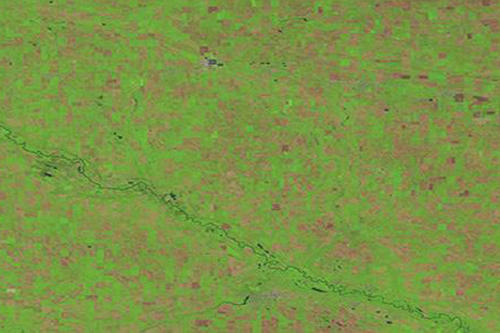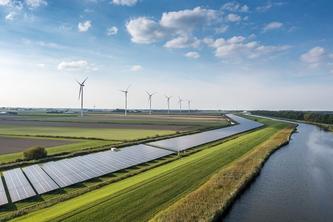
The University of Minnesota Water Resources Center (WRC), a unit of the College of Food, Agricultural and Natural Resource Sciences (CFANS) and University of Minnesota Extension, has received a grant of $2.5 million from the Innovations at the Nexus of Food, Energy and Water Systems (INFEWS) program. Sponsored by the National Science Foundation (NSF), the grant will fund research on innovations for sustainable food, energy, and water supplies in intensively cultivated regions.
Today, the number of humans alive on our planet is 7.5 billion. By 2087, projections show, 11 billion people will be living on Earth. This program helps address how we will continue to have a sustainable supply of food, energy and water, and protect the ecosystems that provide essential "services" for humans.
“Food, water, and energy are all important drivers of Minnesota's economy and played key roles in the history of the state's development,” said principal investigator and Water Resources Center Director Jeffrey Peterson. “These sectors have become increasingly interrelated. Agriculture impacts water resources, while crop production goes into both food and energy products. Without improvements in technology, major tradeoffs would be needed to improve the health of water resources in the face of growing global demands for food and energy. This project focuses on new innovations that create win-wins. Winter camelina, for example, could be incorporated into existing corn-soybean rotations to produce more food or energy and at the same time reduce the impacts on water quality.”
The project includes surveys of hundreds of Minnesota farmers, and will collect information about their cropping systems and their opportunities and barriers for adopting new technologies. Researchers will be contacting farmers in several waves throughout the project and will present results at venues such as the Minnesota Water Resources Conference and the Soil and Water Management Field Day in Lamberton. In addition, one of the project teams will develop new techniques to identify changing cropland patterns, including the adoption of winter cover crops, from satellite imagery. Maps from this imagery, along with reports and other project outputs will be disseminated on the WRC website.
During the four-year project already underway, new maps and processed satellite images will be made available; agronomic trials on camelina will build on current work, accelerating the potential for that system to be adopted more widely. Both of these connect to existing research programs at the CFANS Research and Outreach Centers in Lamberton.
In addition to Peterson, the investigative team is comprised of CFANS scientists and faculty: Axel Garcia, Amit Pradhananga, Jason Hill, Mae Davenport, Jeffrey Strock, Lucy Levers, Natalie Hunt, David Mulla, Brett Dalzell, and Vipin Kumar from the College of Science and Engineering.
About the Water Resources Center
The University of Minnesota’s Water Resources Center provides leadership in freshwater management through cutting-edge research, educational opportunities for students and professionals, and community outreach.
About University of Minnesota College of Food, Agricultural and Natural Resource Sciences
The University of Minnesota College of Food, Agricultural and Natural Resource Sciences (CFANS) brings science-driven innovators together to discover hands-on solutions to global challenges. With 10 research and outreach centers across Minnesota, the Minnesota Landscape Arboretum, and the Bell Museum of Natural History, CFANS offer unparalleled experiential learning opportunities for students and the community. CFANS students enter career fields with some of the best job outlooks in the country, including 13 undergraduate majors and more than 25 minors ranging from agricultural education and marketing communications to conservation biology and forest and natural resource management, health and nutrition, to the future of food and agriculture management with a focus on business and technology.
- Categories:
- Agriculture and Environment





